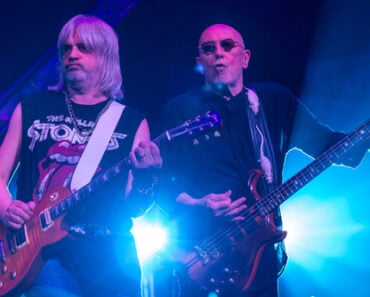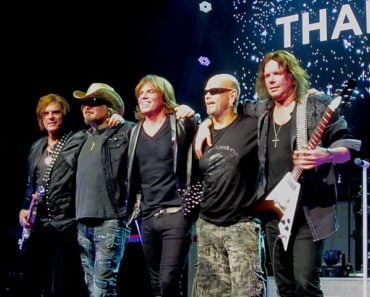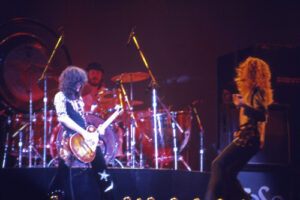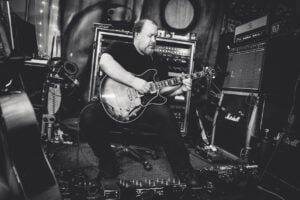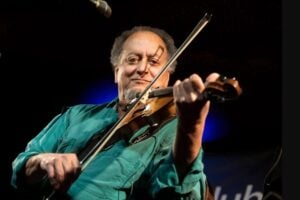
Feature Photo: Jbisaha, CC BY-SA 3.0 <https://creativecommons.org/licenses/by-sa/3.0>, via Wikimedia Commons
Few bands in the annals of rock history have a legacy so equally defined by the hits they created and the superstars they became. The Babys, a British rock group conceived in the mid-1970s, occupy this unique space, remembered for a string of polished arena-rock anthems and as the crucial launching pad for careers that would dominate the charts for the next decade. The band’s story begins not in a garage, but in a London café in 1973, where keyboardist and guitarist Michael Corby had a chance meeting with manager Adrian Millar. This encounter led to a formal management agreement in 1974 and a series of auditions to build a band from the ground up. The first key recruit was vocalist and bassist John Waite, followed by seasoned drummer Tony Brock, formerly of the band Strider. The final piece of the original quartet, lead guitarist Wally Stocker, joined in January 1976, solidifying the lineup that would soon sign to Chrysalis Records. The band’s name was a subject of some debate, but the prevailing story is that it was a deliberate, sardonic joke aimed at record labels obsessed with teen-pop acts, a humorous moniker that was only meant to last a few weeks but ultimately stuck.
In 1976, The Babys secured a contract with Chrysalis Records that was reportedly the highest ever for a new act at the time, a deal valued at over a million dollars and based in part on the emerging potential of music videos. Over the next five years, the band released a quintet of studio albums that defined their initial run: The Babys (1976), Broken Heart (1977), Head First (1978), Union Jacks (1980), and On The Edge (1980). While they cultivated a solid following as an album-oriented rock (AOR) act, their most significant commercial success came via two meticulously crafted power ballads written by outside composers Jack Conrad and Ray Kennedy. “Isn’t It Time,” from Broken Heart, and “Every Time I Think of You,” from Head First, both climbed to number 13 on the U.S. Billboard Hot 100 chart. The band scored another Top 40 hit in 1980 with the driving rocker “Back on My Feet Again” from Union Jacks.
The band’s classic era was marked by a pivotal lineup change in 1978. Following escalating internal tensions, founding member Michael Corby was dismissed, and the group was reshaped with the addition of two American musicians: keyboardist Jonathan Cain and bassist Ricky Phillips. This new five-piece incarnation toured extensively and recorded the band’s final two albums. The group’s initial chapter came to an abrupt end in December 1980, when a tour was cancelled after John Waite tore a ligament on stage during a concert in Akron, Ohio. For over thirty years, the band’s legacy was carried on by its alumni. Then, in 2013, original members Tony Brock and Wally Stocker resurrected the name, launching a search for new musicians to begin the second, unexpected life of The Babys.
The Classic Era (1975-1981)
The first incarnation of The Babys saw the band evolve from a British rock quartet into a transatlantic five-piece AOR powerhouse. This period produced all of their signature hits and established the musical foundation that would later influence the sound of 1980s rock.
The Original Quartet
Michael Corby
As the founder, keyboardist, and rhythm guitarist, Michael Corby was the original architect of The Babys. He initiated the project in 1974 and remained with the band until his contentious dismissal on August 28, 1978. Corby’s contributions are foundational to the band’s first three albums: The Babys, Broken Heart, and Head First. Although he was fired during the recording of Head First, his keyboard and songwriting credits remain on the final release, with his organ and piano work gracing several tracks. His primary contribution was the band’s very existence, but his musical input, particularly the keyboard textures on songs like the epic “Dying Man,” was a key component of their early, more British rock-oriented sound.
John Waite
John Waite was the unmistakable voice and charismatic face of The Babys from his arrival in 1975 until the band’s dissolution in 1981. He performed lead vocals on all five of the band’s classic-era studio albums and initially handled bass duties as well, a role he relinquished after the arrival of Ricky Phillips in 1978 to focus on being the frontman. Waite’s powerful, blues-tinged vocals were the band’s defining characteristic, equally adept at delivering hard-charging rock anthems like “Head First” and emotionally resonant, orchestrated ballads like “Isn’t It Time”. As his confidence grew, so did his role as a songwriter. Following Corby’s departure, Waite became the band’s primary lyricist and a key composer, co-writing many of their later standout tracks, including “Midnight Rendezvous” and “Turn and Walk Away”. He described the period after the lineup change as a creative rebirth, where the remaining trio went back into the studio and wrote some of their best material for the Head First album in a matter of weeks.
After The Babys split, Waite embarked on a hugely successful solo career, defined by the monumental 1984 single “Missing You,” which went to number one on the Billboard Hot 100. His career shows a recurring pattern of achieving massive success within a band structure, only to retreat to a more independent, solo identity. In 1988, he reunited with former Babys members Jonathan Cain and Ricky Phillips to form the supergroup Bad English, which scored another number one hit with the Diane Warren-penned ballad “When I See You Smile”. Despite this success, Waite later reflected that the band members “reverted to type” and that he “wanted to be back solo”. This preference for artistic autonomy over the dynamics of a band explains his lack of interest in participating in a full Babys reunion. Instead, he gave his blessing to the reformed lineup, a move that allows the band’s legacy to continue without requiring his direct involvement, freeing him to pursue his own path. He continues to tour and record as a solo artist, with his setlists celebrating his entire career, and was the subject of the 2022 documentary John Waite: The Hard Way.
Tony Brock
Tony Brock’s explosive and dynamic drumming has been a constant presence throughout the entire history of The Babys. He was a member from 1975 to 1981 and has been the co-leader of the reformed version since 2013. His work is featured on every studio album the band has released, from the 1976 debut The Babys to 2018’s Timeless: Anthology II. Critics and fans alike have lauded his powerful style; the iconic cowbell rhythm that opens “Looking For Love” was his creation, and his ahead-of-its-time drum sound on the Broken Heart album has been noted for its impact. In the reformed era, his role has expanded beyond musician to that of producer and curator of the band’s sound. He has used old instrumental demo tapes from the early 1980s as the foundation for new songs, ensuring a sonic link to their classic material.
Following the 1981 breakup, Brock established a prolific career as a touring and session drummer, most notably spending many years behind the kit for Rod Stewart. His resume also includes work with luminaries such as Roy Orbison, Jeff Beck, Eddie Money, and Australian rocker Jimmy Barnes. His post-Babys work as a producer and the owner of his own recording facility, Silver Dreams Studios, gave him the unique technical skills and artistic vision required to spearhead the band’s unlikely reformation. This evolution from musician to producer was the key enabler of the band’s second act. Brock serves as the essential bridge between the two eras, possessing both the historical legitimacy as an original member and the modern production capability to resurrect the band and guide its new sonic direction.
Wally Stocker
Wally Stocker, the band’s lead guitarist, is the other constant member who has served in both the classic and reformed lineups, from 1976 to 1981 and again from 2013 to the present. His distinctive guitar playing is credited on all of the band’s studio albums. Stocker’s style is frequently cited as a defining element of The Babys’ sound, characterized by a melodic, blues-infused feel and a signature vibrato often compared to that of Paul Kossoff from the band Free. Rather than relying on flashy pyrotechnics, his playing provided a tasteful and soulful rock anchor. He was also a key musical contributor, helping to craft memorable hooks like the descending chorus line of “Head First” and the cruising opening riff for “Midnight Rendezvous”.
After The Babys disbanded, Stocker joined his bandmate Tony Brock in Rod Stewart’s touring band and also had stints with soft-rock group Air Supply and a reformed version of Humble Pie. While John Waite was the voice and Jonathan Cain later became the hit-making songwriter, Stocker provided the consistent tonal center. His guitar work remained the blues-rock foundation even as the band experimented with lush orchestration on “Isn’t It Time” or synthesizer-heavy AOR on Union Jacks. His decision to reunite with Brock for the reformation underscores the belief held by many fans that the essential “sound of the Babys is contained in Wally Stocker & Tony Brock”. He is the quiet pillar of the band, and his signature tone is the most tangible thread connecting the band’s varied stylistic shifts across five decades.
The Five-Piece Evolution
Jonathan Cain
Jonathan Cain’s arrival in late 1978 as the band’s new keyboardist, replacing Michael Corby, heralded a significant transformation in The Babys’ sound. His tenure lasted until he departed for Journey in 1980, and he is featured on the albums Union Jacks (1980) and On The Edge (1980). Cain, an American musician, brought a polished, keyboard-driven sensibility that steered the band away from its British rock roots and firmly into the realm of American AOR. He quickly formed a potent songwriting partnership with John Waite, co-writing many of the standout tracks from their final two albums, including “Back on My Feet Again,” “Midnight Rendezvous,” and “Turn and Walk Away”. His prominent synthesizer work became a hallmark of the band’s later sound.
Cain’s brief time in The Babys served as a crucial incubator for the sound that would soon make him a global superstar. In 1980, he left to join Journey, and his impact was immediate and profound; he co-wrote many of their most iconic songs, including “Don’t Stop Believin’,” “Faithfully,” and “Open Arms,” helping to make their album Escape a monumental success. The polished AOR of The Babys’ Union Jacks was a direct precursor to this sound. The musical and personal relationships forged in The Babys also proved lasting, as Cain reunited with Waite and Ricky Phillips to form the supergroup Bad English in the late 80s. His career illustrates how a role in one successful band can be a springboard to legendary status elsewhere, and his departure was a primary catalyst for The Babys’ 1981 breakup. Inducted into the Rock and Roll Hall of Fame as a member of Journey, Cain has also released numerous solo albums, focusing on contemporary Christian music in recent years.
Ricky Phillips
Bassist Ricky Phillips joined The Babys in late 1978 alongside Jonathan Cain, completing the band’s transition to a five-piece unit. He remained with the group until its 1981 breakup and performed on the final two classic-era albums, Union Jacks and On The Edge. As the second American to join the lineup, his arrival solidified the band’s transatlantic identity. His most significant contribution was functional but crucial: by taking over bass duties, he liberated John Waite from the instrument during live performances. This allowed Waite to evolve into a more dynamic and unencumbered frontman, a vital change as the band was playing larger arena venues.
Phillips’s career after The Babys has been long and distinguished, marking him as a consummate professional anchor. He was a founding member of the platinum-selling supergroup Bad English with Waite and Cain, continuing the musical chemistry forged in The Babys. He has also been a sought-after musician for a wide array of rock royalty, including projects with Coverdale/Page, Ted Nugent, and Ronnie Montrose. His most notable subsequent role was his long tenure as the bassist for the legendary rock band Styx, a position he held for over two decades from 2003 until his departure in early 2024. Phillips’s career path further cements The Babys’ reputation as an incubator for top-tier talent, as three members of its final lineup went on to become core members of three other massive rock entities: Journey, Bad English, and Styx.
The Reformed Era (2013-Present)
After a thirty-two-year hiatus, the band was reborn. Led by original members Tony Brock and Wally Stocker, the new incarnation of The Babys sought to carry the band’s legacy forward with a new lineup, new music, and a renewed commitment to the stage.
John Bisaha
John Bisaha has held the challenging dual role of lead vocalist and bassist for The Babys since the band’s reformation in 2013. He was selected after an extensive talent search to fill the iconic position previously held by John Waite. His contributions are central to the band’s modern studio albums, I’ll Have Some of That! (2014) and Timeless: Anthology II (2018). A lifelong fan of the original band, Bisaha approached the role with a deep respect for the legacy, consciously channeling Waite’s vocal tone on the classic hits while forging his own identity on new material. He is also a key songwriter, co-writing the comeback single “Not Ready to Say Goodbye” and crafting lyrics for instrumental demos from the Brock/Stocker archives to create songs for the I’ll Have Some of That! album.
Before joining The Babys, Bisaha had a diverse career in the entertainment industry, fronting his own bands, performing in acclaimed stage productions of rock operas like Jesus Christ Superstar, and doing character voice-over work. His selection as a fan-turned-frontman was a deliberate strategy to ensure reverence for the original catalog. This creates a dynamic where the new band is both a continuation and a tribute, but it also presents the tightrope walk of balancing homage with evolution. This tension was reflected in the reception of I’ll Have Some of That!, which some critics felt leaned too heavily on modern pop-rock trends rather than the band’s classic sound, despite the group’s stated intention to honor their roots. Bisaha’s tenure exemplifies the modern challenge for legacy bands in replacing an iconic member.
Joey Sykes
Joey Sykes has served as the reformed band’s rhythm guitarist, mandolin player, and backing vocalist since 2013. He is featured on the albums I’ll Have Some of That! and Timeless: Anthology II. Sykes was initially brought into the project as a songwriter, tasked with helping to craft a comeback single that evoked the classic Babys sound. His work on “Not Ready to Say Goodbye” was so successful that he was invited to join the band as a full-time member. He has since become a primary creative engine for the new lineup, writing the single “I See You There” and contributing significantly to the songwriting on the I’ll Have Some of That! album, often by adding lyrics and structure to decades-old instrumental ideas from Brock and Stocker.
Sykes brought with him an extensive industry resume. In the 1990s, he was the lead guitarist and co-writer for the band Coward, which signed a major label deal with Elektra Records. He also toured as a guitarist for established artists like Meredith Brooks (of “I’m a Bitch” fame) and Tommy Henriksen, and has a background in writing and producing for other musicians. His role highlights the practical creative process of a modern legacy act. He was the crucial link who could translate the musical DNA from Brock and Stocker’s old demos into finished, contemporary songs, acting as the bridge between the band’s past intentions and its present-day reality.
Other Key Contributors
The Babettes (Holly Bisaha & Elisa Chadbourne)
A signature element of The Babys’ biggest hits was the lush, soulful backing vocals, particularly on tracks like “Isn’t It Time”. When reforming the band in 2013, Tony Brock and Wally Stocker made the deliberate decision to recreate this component by formally establishing “The Babettes” to “capture and complete the full richest of the classic sound”. This role has been filled since 2013 by Holly Bisaha (wife of frontman John Bisaha) and Elisa Chadbourne. Both are credited with backing vocals on the 2014 album I’ll Have Some of That!. They bring extensive experience as session and touring vocalists, having worked with artists like Stevie Wonder, Frankie Valli, and The Black Eyed Peas between them. The formal revival of The Babettes was a strategic move, demonstrating a deep understanding of their brand and a commitment to meticulously reconstructing the layered production that made their most famous songs so memorable.
Walter Ino
Since approximately 2017, the role of touring keyboardist and guitarist has been filled by Walter Ino. His contributions are primarily in the live setting, where the multi-instrumentalist covers the crucial keyboard parts originally played by Michael Corby and Jonathan Cain, ensuring the full sonic palette of the band’s catalog is represented on stage. Ino is a highly experienced Los Angeles-based musician, producer, and musical director. His impressive resume includes tenures with the Grammy-winning band Survivor and Eagles of Death Metal, and he also serves as a musical director for large-scale symphonic rock productions. Ino’s role is emblematic of the modern touring professional required by legacy acts—a versatile and skilled musician capable of flawlessly recreating parts from different eras of a band’s history.
A Concluding Note on Other Members
To ensure a truly exhaustive history, it is important to acknowledge other musicians who have been part of The Babys’ story. In the band’s earliest days, before their first record deal, musician Matt Irving was briefly a member on guitar, bass, and keyboards. When the band first reformed in 2013, the rhythm guitar position was initially held by J.P. Cervoni before Joey Sykes joined the lineup. The touring keyboardist role in the modern era has also been filled by a rotating cast of talented players, including Francesco Saglietti, Eric Ragno, Brian Johnson, and Louis Middleton, all of whom played a part in bringing the band’s music to live audiences once again. Together, these contributors complete the full and complex family tree of The Babys.
Check out more The Babys articles on ClassicRockHistory.com Just click on any of the links below……
Complete List Of The Babys Albums And Complete Discography
Top 10 Songs By The Babys
Read More: Artists’ Interviews Directory At ClassicRockHistory.com
Read More: Classic Rock Bands List And Directory


